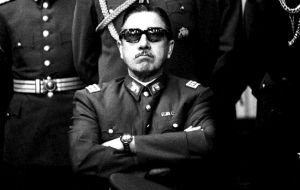MercoPress. South Atlantic News Agency
Disclosed documents reveal Brazilian strong support for the Pinochet regime in Chile
 Two months after the coup Pinochet received funds from Brazil
Two months after the coup Pinochet received funds from Brazil Brazilian newspaper Folha de São Paulo published a report on this week revealing a series of 266 telegrams from the Brazilian embassy in Santiago that unveiled strong economic and diplomatic ties between the nations’ military regimes in the early 1970s.
The telegrams were retrieved by the Brazilian Embassy in Santiago after Brazilian President Dilma Rousseff passed a government transparency law and opened a national truth commission earlier this month. The cables span from 1973 to 1976 and reveal coordination between the governments of Chile and Brazil that served to sustain oppressive policies under both regimes.
According to Folha, two months after the September 1973 coup de état that saw Gen. Augusto Pinochet overthrow socialist President Salvador Allende, the Pinochet government was granted a loan worth 50 million dollars from Brazil, governed by Emílio Médici’s military regime.
The loan was the result of a request by the Chilean foreign minister, who characterized Chile’s economic state as “grave.” Brazil also worked to help stimulate Chile’s copper exports and offered credit to local exporters interested in business with Chile.
After the 1973 coup, Chile continued to experience an economic contraction, while Brazil’s economy was growing at rates at over 7% (even higher than its growth rate today).
Yet the embassy cables show that Brazil did not solely support Chile economically. At the start of the Pinochet regime Brazil also helped Chile to finance the purchase of an intelligence communications system.
Embassy cables revealed that the nations also coordinated matters of international diplomacy. In telegrams directed to the Brazilian Embassy, the Chilean government asked Brazil to “protect Chilean interests” in Mexico, Poland, and Yugoslavia, which at the time condemned the Chilean coup.
Brazil and Chile likewise agreed to support each other in the international fora like the Organization of American States (OAS). The telegrams reported that Chile showed “enthusiastic support” for the election of a Brazilian politician to the organization’s Committee on Juridical and Political Affairs.
In turn, Brazil helped to prevent the OAS from passing resolutions that could have imposed constraints on the Pinochet regime for its human rights abuses.
According to a 1975 telegram “the initial project which was a substantially strong motion condemning the Chilean government, was ‘watered down’ by the initiatives of Brazil and Argentina”.
Both Chile and Brazil were involved in the top-secret initiative Operation Condor, which sought to create regional intelligence networks in order to locate and oppress political opponents of the military regimes across the Southern Cone.
Revelations from the embassy cables follow last week’s announcement that Mercosur (comprised of Brazil, Argentina, Uruguay and Paraguay) would investigate Operation Condor and the links between the dictatorships of the era. The Chilean government has yet to announce its participation in the investigation.
Peter Kornbluh, director of the National Security Archive’s Chile Documentation Project, explained the operation in his book “The Pinochet File”: “Victims numbered in the hundreds, as the Condor nations collaborated in cross-border manhunts-tracking, surveillance, kidnappings, torture, interrogation, and elimination of opponents.”
By David Pedigo - The Santiago Times




Top Comments
Disclaimer & comment rules-

-

-

Read all commentsI don't see the names of the United Kingdom and the United States of America. Why not Mercopress?
Dec 17th, 2011 - 08:45 am 0Who said that dictators and mass murderes can't be friends with the UK? :)
http://www.youtube.com/watch?v=XJJnoRwF9ow
They wouldn't get involved in this posts.The yanquis and Brits don't see anything wrong,to them it's economic development
Dec 17th, 2011 - 09:44 am 0@2
Dec 17th, 2011 - 10:55 am 0No we will leave it to the Argies,cant beat first hand experience
Commenting for this story is now closed.
If you have a Facebook account, become a fan and comment on our Facebook Page!